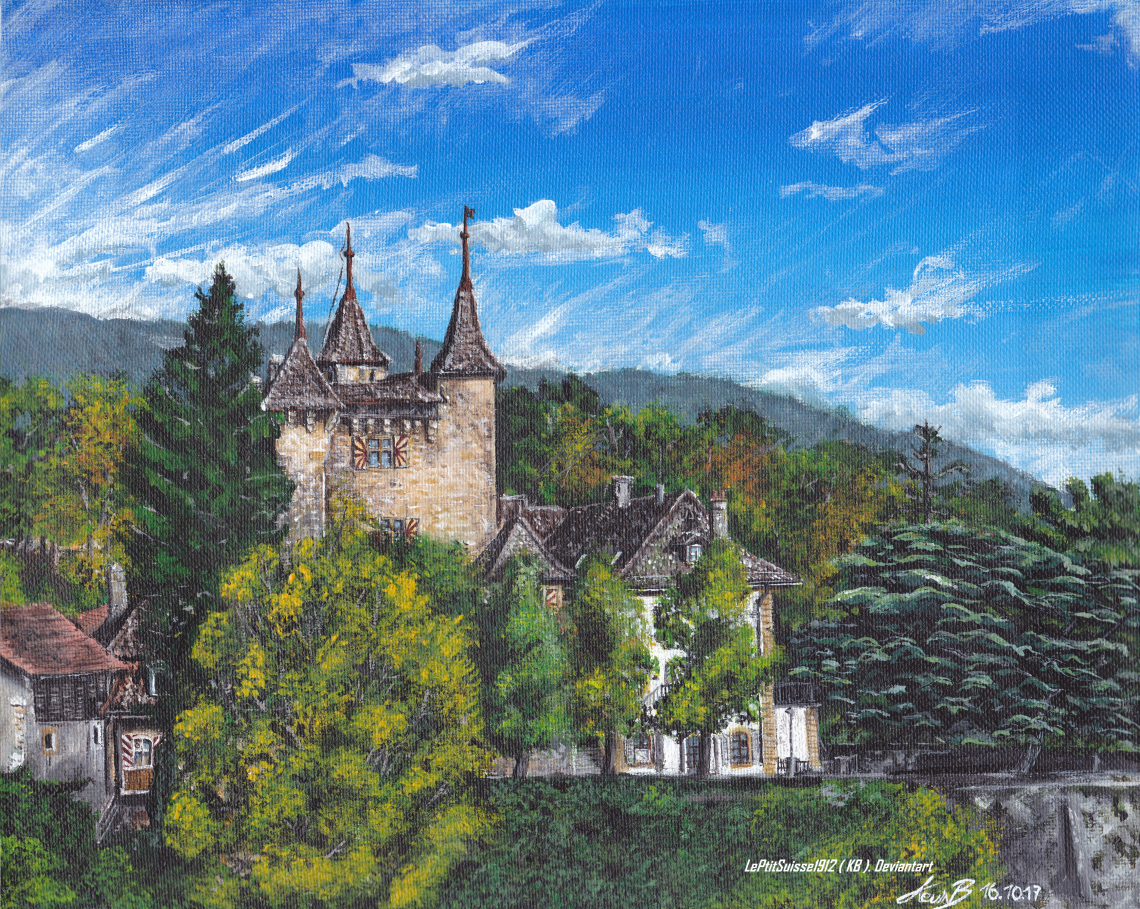
Château de Vaumarcus
Description
Sur un contrefort rocheux sur les rives du lac de Neuchâtel, le château de Vaumarcus offre de loin un aspect guerrier, avec ses mâchicoulis. On distingue plusieurs étapes dans sa construction, lesquelles expliquent le manque de symétrie dans le bâtiment.
Il y eut tout d'abord un château dont l'entrée était à plus de 7 m du sol. On pouvait certainement y accédé de l'extérieur par un escalier en bois que l'on enlevait en cas de danger. La cuisine, dont il reste des vestiges de cheminée, était au rez-de-chaussée.
Mais la famille de Vaumarcus se débattait depuis longtemps contre les problèmes d’argent. Poursuivi par ses créanciers, le dernier seigneur du lieu, Pierre de Vaumarcus, en 1308, vendit château et terre au puissant comte Rollin de Neuchâtel, tout heureux d'agrandir son domaine.
Le comte Rollin, tout en confiant la garde du château à l'ancien seigneur, entreprit de renforcer la construction originale en perçant au rez-de-chaussée une porte gothique, précédée d'un pont-levis et surmontée de mâchicoulis. En outre, il consolida les deux angles de la façade par deux énormes contreforts au-dessus desquels il plaça des tourelles, tandis qu'en arrière il construisait une tour d'escalier hexagonale.
Le château de Vaumarcus offre ainsi un excellent exemple de cette transformation opérée dans la plupart des châteaux au 13e siècle, pour leur permettre de mieux se défendre contre un assaillant disposant de moyens plus puissants, tels que les machines de jet.
Un autre perfectionnement de la défense apparaît encore à Vaumarcus: c'est la tour ronde à gauche de l'entrée. Les tours rondes se construisirent un peu partout après 1250, quand on eut constaté combien elles résistaient mieux aux machines de siège, les projectiles rebondissant de côté au lieu d'ébranler le mur.
Le château de Vaumarcus fut assiégé par les Suisses après la bataille de Grandson en 1476. Le château fut alors incendié. Il passa ensuite aux Bonstetten dès 1599 et aux Büren de 1675 à 1888. Le vieux château a été reconstruit après 1476; le nouveau château, situé au nord-est et entouré d'une terrasse, remonte à 1773.
Le château abrite actuellement un centre administratif international, un restaurant familial et gastronomique et un centre culturel.
Texte et informations tirés du site de Swisscastle. ch. tous droit réservés
http://www.swisscastles.ch/Neuchatel/vaumarcus.html
Le Tableau est en Acrylique
On a rocky buttress on the shore of Lake Neuchâtel, the castle of Vaumarcus offers from a distance a warlike aspect, with its machicolations. There are several stages in its construction, which explain the lack of symmetry in this building all in height.
There was first of all a castle whose entrance was more than 7 m from the ground. it was possible to access it from the outside by a wooden staircase which was removed in case of danger. The kitchen, of which there are remains of chimney, was on the ground floor.
But the family of Vaumarcus had been struggling for a long time against the financial difficulties. Pursued by his creditors, the last lord of the place, Pierre de Vaumarcus, in 1308, sold castle and land to the powerful Count Rollin de Neuchâtel, happy to expand his domain.
Count Rollin, while entrusting the guard of the castle to the former Lord, undertook to reinforce the original construction by piercing on the ground floor a Gothic door, preceded by a drawbridge and surmounted by machicolations. In addition, he consolidated the two angles of the façade by two enormous buttresses above which he placed turrets, while at the rear, he built a hexagonal staircase tower.
The castle of Vaumarcus offers an excellent example of this transformation carried out in most castles in the 13th century, to enable them to better defend themselves against an assailant with more powerful means, such as throwing machine.
Another improvement of the defense still appears at Vaumarcus: it is the round tower to the left of the entrance. The round towers were built almost everywhere after 1250, when it was found that they were more resistant to the siege machines, the projectiles bouncing off instead of shaking the wall.
The castle of Vaumarcus was besieged by the Swiss army after the battle of Grandson in 1476. The castle was then burned down. It then moved to the hands of Bonstetten familly at 1599 and then to the Büren from 1675 to 1888. The old castle was rebuilt after 1476; the new castle, northeast and surrounded by a terrace, dates back to 1773.
The castle currently houses an international administrative center, a family restaurant and a cultural center.
Text and informations from the website of Swisscastle.ch all rights reserved
http://www.swisscastles.ch/Neuchatel/vaumarcus.html
The Canvas is in Acrylic paint

